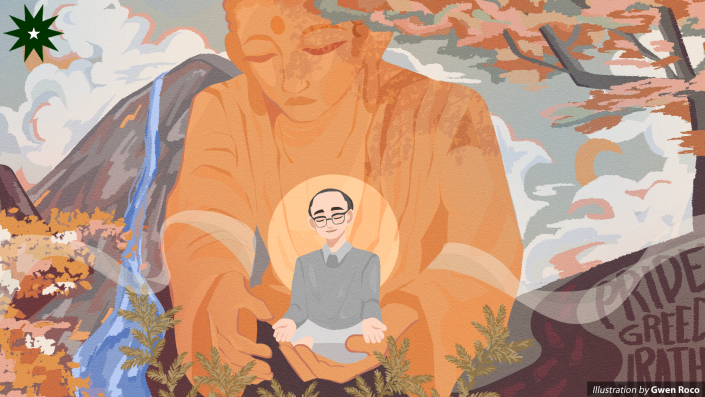Buddhism has been practiced with much gravity over the past years. Its origins started with the teachings of Indian prince Siddhartha Gautama, later known as Buddha. After noticing the hardships of his people, he established the idea of The Middle Way, noting that neither extreme wealth nor poverty will lead toward enlightenment. While not a religion in the conventional manner of worshipping deities, Buddhism hinges on the idea of religion-based morality without subscribing to the concept of a personal god.

Buddhism has diverged into two major sects: the Mahayana or the Greater Vehicle, and the Theravada or the Way of the Elders. Both differ in their means to achieve enlightenment—the former saying it is achievable by all sentient beings, and the latter saying it is only attainable through monastic life.
Today, Buddha’s teachings continue to be practiced around the world, including the predominantly Catholic Philippines, with about 26,300 practicing Buddhists living in the country. Philippine Theravada Buddhist Fellowship (PTBF) founder Mon Rivera finds himself at the forefront of Buddhist practice, one that allows followers to reconnect with themselves and with those around them.
Taking the journey together
Coming from a Catholic upbringing, Rivera’s journey began with his curiosity about other religions. “I reached a point where I could accept that all religions had some truth to tell,” he shares. He believed that his personal ideologies did not align with any religion, proclaiming himself as “non-religious” at one time.
When his friend encouraged him to take a course on Vipassana meditation, a journey toward realizing the true nature of existence, Rivera became enticed to look into the Theravada tradition. But this self-discovery took him a year to fully comprehend. “Buddhism is really experiential,” he notes. “You should really get into the real practice because it’s how you develop yourself—you become gentler [and] wiser.”
In the Philippines, Theravada Buddhism is mainly practiced by PTBF, an internationally recognized local organization. While they have been classified as lay-order because no Theravada monks reside in the country, PTBF conducts online courses that cater to those who wish to continue Buddhist practice during the pandemic.
Through his experiences with PTBF, Rivera describes Theravada Buddhism as a religion that “[brings] people together.” He notes, “You’re not practicing only for yourself or by yourself, but you’re practicing in the context of a wider community wherein you support one another.”
Do good, no evil
In the goal to purify his heart and mind, Rivera acknowledges that the biggest challenge he encounters is the need to establish himself through meditation. “The challenge here is trying to get at the root of our behavior,” he notes. Aside from knowing the Four Noble Truths and Noble Eightfold Path by heart, putting this wisdom into action is vital. One way of doing this is to practice ahimsa or non-violence. “When I drive, minsan umiinit ulo ko kasi sisingitan ka…Then I remember, ‘Relax lang, just wish them well,’” he cites.
(When I drive, sometimes I get furious at those who cut the queue.)
Additionally, he mentions that the upcoming elections will be a test for his Buddhist ideals. He judges each candidate through Buddhism’s five prefects: “not to kill, not to steal, not to have sexual misconduct, not to lie, [and] not to take intoxicants and mind-altering drugs,” Rivera explains. “Kung fail lahat ‘yan, bakit ko susuportahan? Why should I choose somebody that does not represent my vision of what society is about?”
(If a candidate fails all prefects, why should I support them?)
In dictating one’s morality, Buddhism provides a universal system of retribution known as Karma. Rivera explains it as “the action or deed or speech done willingly or with volition,” where one’s intentions and morals should always be taken into careful consideration. This balance of Karma is what helps followers achieve Nirvana, the liberation from all attachments and desires, which is the ultimate goal of Buddhism. Through constant meditation and application of Buddha’s teachings, one must look deeply into their inclinations and desires without relying on others to address them. “All of these wrong decisions…who made them? Tayo rin,” he points out.
(We did.)
However, he clarifies, “Nirvana is not a metaphysical afterlife that people go to when they die.” Instead, it is being in the optimum state of virtue, “What is more important in Buddhism is what you practice, what you’re getting out of it, and then [how practical you are] about it.”
The ultimate pursuit
Buddhism stresses that salvation is the product of one’s own efforts. In Buddha’s teachings, achieving Nirvana means arriving at inner peace. “Gusto lang namin maging happy based not on our sensual desires or pleasures,” Rivera opines. “[We want] happiness that is not dependent on [material] things, but happiness [that] is a state of mind.”
(All we want is to be happy based not on our sensual desires or pleasures.)
Taking refuge in Buddha allows practitioners to recognize their capacity to achieve Nirvana by using the standards of non-violence, compassion, wisdom, and kindness, just as Buddha did in reaching perfection. Rivera shares that Buddhism “develops the human potential to reach [its] optimal.” And while their beliefs may value the outcomes of one’s actions, practitioners are also advised to focus on the present. The heart of the Buddhist experience exists in the here and now, not in a far off future. “Nirvana is not something that happens after one lifetime, it is happening during this lifetime,” Rivera reminds.
Facing hardships and struggles in life may be inevitable, but being in a state of Nirvana means not letting our experiences influence us into being corrupted by the human world and its ideologies. With Buddhism, one is encouraged to search within, and to rediscover and redefine the religion’s teachings for oneself.
